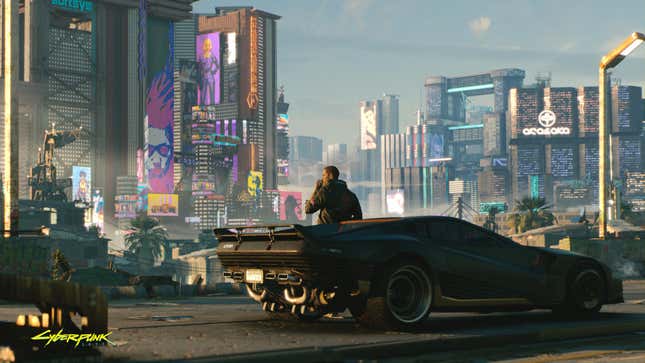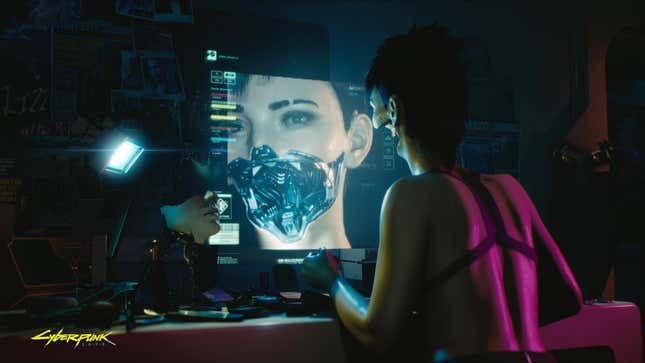
Footage of the upcoming role-playing game Cyberpunk 2077 has blown away fans so far, but coupled with that hype is a burning question: Are workers at CD Projekt Red, the Polish studio behind the game, ruining their lives to make it? The developer best known for The Witcher series has cultivated a reputation for crunch—asking its employees to work nights and weekends for weeks or months at a time—but studio management now tells Kotaku they want to improve their work-life balance, even if they continue to feel that crunch is a necessity.
“We’re known—let me be humble for a moment here—we are known for treating gamers with respect,” said Marcin Iwiński, the company’s co-founder, in an interview with Kotaku this week. “This is what we’ve been working hard toward. And I actually would [like] for us to also be known for treating developers with respect.”
One of the ways the company plans to do that, Iwiński said, is through a “non-obligatory crunch policy” that isn’t brand new but that the Warsaw-based CD Projekt Red plans to push harder. He wants to make it clear to Cyberpunk 2077’s developers that even when the studio asks them to work on nights and weekends, it’s not “mandatory.”
“We’ve been working toward it for some time already,” Iwiński said. “We’ve been communicating clearly to people that of course there are certain moments where we need to work harder—like I think the E3 demo is a pretty good example—but we want to be more humane and treat people with respect. If they need to take time off, they can take time off. Nobody will be frowned upon if this will be requested.”
Of course, anyone who’s worked anywhere knows that a request from the boss doesn’t need to be “mandatory” for it to be something you have to do. When probed, Iwiński wouldn’t promise to limit crunch to certain periods or offer specific numbers, other than to say that he hoped making this public statement would help CD Projekt Red employees feel more comfortable telling their managers when they don’t want to put in extra hours. “I think this is the commitment we’re ready to make today, and we’ll be listening to people,” he said. “We definitely open a lot of lines of dialogue here, and we’d like to start with that.”

I had been booking an E3 appointment for Cyberpunk 2077 when a representative for CD Projekt Red offered to put me in touch with Iwiński and Adam Badowski, the studio head and director of Cyberpunk, to talk about work conditions at their company. They said they had been following the conversations happening today in the video game industry and reading recent investigations by Kotaku and other outlets into labor practices at companies like Rockstar and BioWare. Crunch is ubiquitous in the video game industry, and CD Projekt Red wanted to take at least some sort of stance on it. They said they wanted to show that they were listening, improving, and working to ensure that Cyberpunk 2077’s development would be less painful than The Witcher 3’s, which forced most of the company to put in extensive hours.
Perhaps they also wanted to preempt a potential story. After the publication of our Anthem investigation last month, which documented a turbulent development marked by mismanagement, crunch, and anxiety, four former CD Projekt Red employees reached out to tell me that they had seen similar problems in Warsaw. “I’ve felt that there are hundreds of parallels that could be drawn between the story of the rocky development of Anthem and the story of the rocky and even-more-rocky-to-become development of Cyberpunk 2077,” said one former CDPR employee in an e-mail. “At times, I’ve felt I could just replace the studio name and the game title, and it would all look so similar, almost identical.”
There have been rumors of financial trouble swirling within CD Projekt Red following the disappointing performance of last year’s Thronebreaker campaign for the studio’s virtual card game Gwent. Iwiński and Badowski denied the rumors. “We have a big war chest,” Iwiński said. There have also been signs that development on Cyberpunk 2077 might not be going smoothly. For example, as the employees who reached out told me, this year the company has told staff to work through Polish holidays, and that there will be mandated periods for vacation. Rather than take off whenever they’d like, CD Projekt Red’s developers have to limit their vacation to specific times in 2019. One period will be this summer, right after E3, while another will be in the winter.
The managers confirmed as much when I asked. “We are trying to organize the vacations better, and to streamline the effort,” said Adam Badowski. “It’s a general rule for the studio, but if there are special occasions, we will obviously take care of those kind of people. And this is our take on this this year. And we will see—maybe it’s good, maybe it’s wrong. We will do a survey after that and take care of people… When the production takes five years, for four years it’s super normal, and then it’s the last year, and we have some special rules just for this period.”
Although CD Projekt Red first announced Cyberpunk 2077 in 2013, development of the game didn’t really start until 2015, after the launch of The Witcher 3. Then followed a difficult period of preproduction (including at least one major directional shift), and the studio made the very-common mistake of moving their entire development team to Cyberpunk before the project could support that many people. Add major technological overhauls and you’ve got a recipe for disaster. “It’s always the same story across the entire industry,” said Badowski. “If you’re changing the technology and at the same time you’re producing the game, it’s a nightmare for most of the companies.”
It led to a difficult period for the company, one marked by turnover and unclear direction. “The transition from The Witcher 3 to Cyberpunk, initially that was the hardest part, because a lot of these things have to be defined,” said Iwiński. “We have a demo which is sort of crystallizing the vision, to prove that it’s there.”
That demo, a gorgeous 45-minute deep dive into the seedy streets and flashy combat of Cyberpunk 2077, stole the show at E3 2018. It also felt, to those of us who have heard countless stories from overworked developers, like the product of intense crunch. That hypothesis was confirmed by several people who worked on the game, some of whom had reached out after our Rockstar reporting last year to tell me that CD Projekt Red also embraced a “culture of crunch” in which employees felt pressure to work extensive overtime.
Perhaps it depends on the department. In conversations with Kotaku, some people who work or have worked on Cyberpunk 2077 said they’re not working much overtime just yet. One told me this week that this was the best period they’ve ever had at the company. Others have said the opposite. Stories suggest that some departments, like the QA (testing), audio, and tech teams, have had to put in particularly long hours in the lead-up to important milestones like the game’s two E3 demos.
Unlike many other game studios, which avoid paying overtime to employees on annual salaries, CD Projekt Red pays all of its staff for overtime—150% for nights, and 200% for weekends. For many, that isn’t enough to make up for lost family time and other mental and physical issues that can result from overwork. (It’s also not massively lucrative; the cost of living is lower in Poland, so salaries can range lower than they are in western Europe or the United States.)
This is an issue that CD Projekt Red is acknowledging, although at the same time, studio management continues to argue that crunch is a necessary part of making games like The Witcher 3 and Cyberpunk 2077 as good as possible. (The Witcher 3 is widely considered to be one of the greatest RPGs of the decade.)
“From a wider perspective, we need to remember that the whole production takes, say, four years, sometimes five years, and most of the time, like three years, there’s no crunch,” said Badowski. “There’s no additional hours. Sometimes before E3 [we crunch], but most of the time the production is super normal. We are talking about the very last round towards the release. And it’s always difficult to manage, but you know that there are some complications. It’s really difficult not to use all the forces at the very end. Plus there’s another factor—sometimes we have unique specialties, very unique people, and you cannot clone them. We need them to work on highly specific things. And we need to ask them to spend more time on something highly specific because there’s no other way to do it. It’s mostly R&D or very special requests, like tools.”
Iwiński and Badowski said they put buffer periods into their schedules to account for the unknown variables that can come up during development. When I asked if they planned for overtime in their schedules for games like Cyberpunk 2077, they demurred. “We’re trying not to plan it,” said Iwiński. “However, sometimes it results in that, yes, so we need additional time. Internal planning in games is really hard.”
They were also noncommittal on the idea of unionization. “It’s very country-specific, we don’t have a clear answer about it,” Iwiński said when I asked how he’d react if CD Projekt Red’s employees decided to organize. “We don’t know; we haven’t been thinking about it. If it happens, we’ll consider it.”
CD Projekt Red approached me because they wanted to make a public commitment to their employees’ health. It’s a pledge that they say they want to be public so that employees can hold them to it. If a developer wants to opt out of crunch or take time off, and their manager is resistant, perhaps they can say that they read on Kotaku that it was okay. Maybe that’ll work. Or maybe it won’t.
“We’ve created a lot of force functions for us to improve,” said Iwiński. “Making this commitment, I hope it shows that we are treating this matter very seriously.”
“We do have private lives as well,” said Badowski. “We are getting older, and most of the people who are responsible for crunch, they have families, little kids, and they feel exactly the same.”
When pressed, the one specific promise they’d make was that Cyberpunk 2077's final hours will be less crunchy than the last game’s. “I think we can promise that it’ll be better than The Witcher’s finishing period,” Badowski said.
CD Projekt Red hasn’t yet said when Cyberpunk 2077 will be out, but 2020 is a safe guess, which means that the next year will be pivotal not just for the quality of the game but for the quality of employees’ lives. It’s clear that not everything has gone smoothly, based on the testimonies I’ve heard from former employees and CD Projekt Red’s new vacation policy. We’ll see. By this time next year, we’ll have a better idea of just how serious Iwiński and Badowski were about wanting to be known for treating their developers humanely.